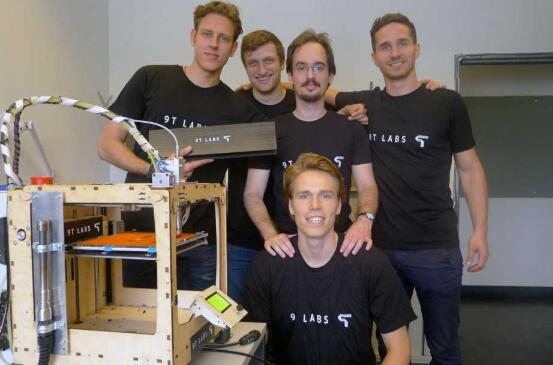ETH Spin-off 9T Labs Develops Carbon-Fiber Reinforced Plastic Printer
Three ETH alumni have developed a 3D printer capable of manufacturing components from carbon fiber composites. Their ETH spin-off, 9T Labs, could bring a breakthrough for the manufacturing and utilization of extremely lightweight and strong parts.

Part of 9T Labs team (left to right): Giovanni Cavolina, Filippo Kusch, Selçuk Ercan, Martin Eichenhofer, Chester Houwink next to the prototype 3D printer. (Photograph: Courtesy of 9T Labs)
Stronger than steel, but up to five times lighter: carbon fibre-reinforced plastic (CFRP), often simply referred to as carbon, is ideal for making anything that needs to be incredibly strong, but still very lightweight: aircraft, Formula 1 racing cars and mountain bikes, as well as robots, medical protheses and implants. No wonder carbon is at high demand in the global market.
But there’s a problem: Carbon fiber composite is expensive compared with aluminium or steel, as the manufacturing process is very costly and time-consuming. Composites consist of carbon fibers and plastic to be combined and processed to make the highly durable material. A separate mould or negative form is usually required for every single component, adding to the high production costs.
![]() Producing carbon components without moulds
Producing carbon components without moulds
The ETH spin-off 9T Labs now offers an alternative: It has developed a 3D printer capable of printing carbon fiber composite parts. These are no longer made using cumbersome moulds, but are designed on the computer using dedicated software and then manufactured by the printer. Plastic and carbon fibres are combined directly in the printer, by forcing the materials through a heated nozzle.
“We combine the advantages of 3D printing technology with the valuable properties of carbon fiber composites,” says Giovanni Cavolina, one of the founders of 9T Labs. On the one hand, the new procedure eliminates what is currently the biggest drawback of using this performance material – the high costs. The whole manufacturing process therefore takes less time and money. On top of this, the new technology allows components with highly complex geometric shapes to be produced, such as used in the construction of satellite antennae or a hand prosthesis. Last but not least, using a 3D printer means less material waste.
![]() A meteoric rise
A meteoric rise
The three founders of 9T Labs are all ETH alumni: Martin Eichenhofer (30), Giovanni Cavolina (26) and Chester Houwink (25). Eichenhofer first had the idea of a start-up four years ago while conducting research in the Laboratory of Composite Materials and Adaptive Structures under Professor Paolo Ermanni. The idea really got off the ground at the start of 2018: a joint-stock company was founded in January that attracted a total of CHF 300,000 from investors. The European Space Agency also invited the young company to join an incubation centre (ESA BIC Switzerland), which not only provided access to another CHF 200,000 but to a good industry network.
“There are many different potential applications for our printed carbon fiber components, and there is a huge amount of interest from industry. We basically expand the scope of what can be manufactured using such performance materials,” says Eichenhofer, who is currently in the process of finishing his doctoral thesis. Cavolina adds: “We believe it is important for the business to be geared towards the market. We therefore want to get a product onto the market as quickly as possible, so we can generate useful feedback.”
![]() Printing system should be ready next year
Printing system should be ready next year
A complete printing system comprising both hardware and software should be ready for beta testing at the start of next year. After that, the challenge will be to serve the right sectors in the right order. 9T Labs wants to start with customers engaged in research and development, mainly universities and technical institutes. “We hope to get good technical feedback from these customers, which will help us to continuously improve the product,” Cavolina says.
The engineers are currently fine-tuning the prototype 3D printer. The start-up is still housed in ETH premises, in the Technopark in the Zurich-West quarter. But that could change very soon, as the young company is rapidly expanding and constantly recruiting new people. Eight staff, including interns, are currently working for 9T Labs, with another four set to join over the course of the year.
Cavolina sees one of the biggest challenges as putting the right team together. “It’s not easy to find good software and hardware engineers,” he says. Much time and effort is therefore being invested in recruiting new personnel. For as Cavolina says, “We need really good people to ensure that the product satisfies market requirements”.
Source: ETH




Recent Comments